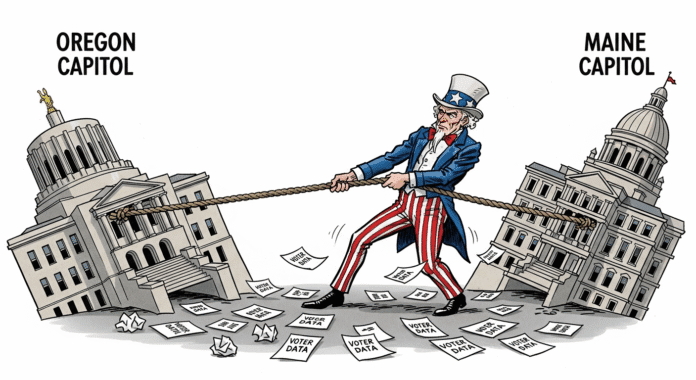Federal Government Escalates Fight for State Voter Information
The Justice Department’s decision to sue Oregon and Maine over voter registration data represents a significant escalation in federal-state tensions over election oversight. This legal battle highlights the ongoing struggle between federal enforcement authority and state privacy protections in our democratic system.
The lawsuits, filed Tuesday, came after both states’ secretaries of state refused repeated DOJ requests for unredacted electronic voter lists and maintenance procedures under the National Voter Registration Act. This confrontation raises critical questions about who controls voter information and how far federal authorities can reach into state election systems.
The Legal Foundation Behind Federal Demands
National Voter Registration Act Requirements
The Justice Department bases its legal action on the National Voter Registration Act and related federal election laws. These statutes require states to maintain accurate voter rolls and provide certain information to federal authorities upon request.
Federal officials argue that access to complete voter registration data is essential for enforcing election laws and ensuring compliance with federal requirements. The DOJ contends that Oregon and Maine’s refusal to provide unredacted voter lists violates their legal obligations under federal law.
States Push Back on Federal Authority
Oregon Secretary of State Tobias Read and Maine Secretary of State Shenna Bellows have mounted strong resistance to the federal demands. Both officials argue the DOJ lacks proper authority to demand such comprehensive voter data.
“Maine conducts some of the nation’s most reliable elections,” Bellows stated, describing the DOJ’s inquiry as “an excessive move aimed at the state.” Her response reflects broader concerns about federal overreach in state election administration.
Read expressed similar defiance, stating his readiness “to challenge in court any attempt by the President to leverage the DOJ against his political adversaries.” This language suggests state officials view the federal action as politically motivated rather than legally necessary.
Privacy Concerns Drive State Resistance
Protecting Voter Information
State officials cite privacy concerns as a primary reason for refusing federal demands. Voter registration data contains sensitive personal information that states traditionally protect under their own privacy laws and regulations.
The tension between federal enforcement needs and individual privacy rights creates a complex legal landscape. States must balance their obligation to comply with federal law against their responsibility to protect citizen privacy.
Unredacted Data Raises Stakes
The DOJ’s specific request for unredacted electronic voter lists amplifies privacy concerns. Redacted information typically removes sensitive personal details while preserving data needed for legitimate oversight purposes.
By demanding unredacted lists, federal authorities seek access to complete voter information, including details that states normally protect. This comprehensive data request explains why state officials view the federal demands as excessive.
Federal-State Authority Questions
Constitutional Balance of Power
The lawsuits highlight fundamental questions about the constitutional balance between federal and state authority over elections. While the Constitution grants states primary responsibility for conducting elections, federal law establishes certain requirements and oversight mechanisms.
This tension becomes particularly acute when federal authorities demand information that states consider protected under their own laws and constitutional provisions. The courts must now determine where federal authority ends and state sovereignty begins.
Precedent-Setting Implications
The outcome of these lawsuits could establish important precedents for future federal-state election disputes. A federal victory might expand DOJ authority to demand voter information from resistant states. A state victory could limit federal oversight capabilities.
Legal experts will closely watch how courts balance competing interests in federal election law enforcement versus state privacy protections and administrative autonomy.
Political Context and Timing
Claims of Illegal Voting
The DOJ’s aggressive pursuit of voter data occurs amid ongoing claims about illegal voting by undocumented immigrants. While these claims lack substantial evidence, they have influenced federal policy and enforcement priorities.
State officials appear to view the federal demands through this political lens, suggesting the requests serve partisan rather than legitimate enforcement purposes. This perception complicates the legal dispute with political overtones.
Election Integrity Debates
The broader national debate over election integrity provides context for understanding both federal demands and state resistance. Different perspectives on election security and voter access influence how officials approach these legal requirements.
Federal authorities may view comprehensive data access as essential for detecting and preventing election law violations. State officials may see the same demands as unnecessary intrusion that could undermine voter confidence and participation.
What This Means for Voters
Immediate Impact
For now, voters in Oregon and Maine should expect their state officials to continue protecting voter information while fighting federal demands in court. The legal process will likely take months or years to resolve completely.
Voter registration and election processes should continue normally while the litigation proceeds. State election systems remain under state control regardless of the federal lawsuit outcomes.
Long-term Implications
The resolution of these cases could significantly impact how federal authorities interact with state election systems nationwide. Other states will watch closely to understand their own obligations and rights regarding voter data requests.
Voters should stay informed about how these legal battles might affect their privacy rights and the security of their personal information in voter registration systems.
Moving Forward: What to Watch
The legal battle between the DOJ and these two states represents more than a simple compliance dispute. It embodies fundamental questions about federalism, privacy rights, and election administration in our democratic system.
Citizens should monitor how courts balance federal enforcement authority against state sovereignty and individual privacy rights. The precedents established in these cases will influence election law and federal-state relations for years to come.
Stay engaged with your state and local election officials to understand how these developments might affect your voting experience and privacy rights. Democracy works best when citizens remain informed and actively participate in the process.



